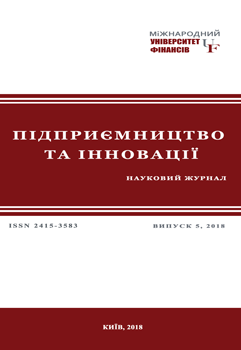METHODS FOR MANAGEMENT OF THE ENTERPRISE’S ACCOUNTS RECEIVABLE
Abstract
The article analyses the peculiarities of the formation of current assets at enterprises, investigates the economic essence of accounts receivable and their typology. The article deals with the consideration of theoretical and methodological approaches to the management of receivables of enterprises. To achieve the objectives, we carried out the analysis of the process of the formation and repayment of accounts receivable at the enterprise BNH Ukraine Ltd. The results of the statistical analysis of the accounts receivable management at the enterprises of the wholesale trade in petroleum-based products are given. On the basis of the conducted researches, we have generalized the results of the experimental implementation of a differentiated credit policy of the enterprise in terms of controllability of receivables.
References
Bilyk, M. D. (2003), “Management of the enterprise’s accounts receivable”, Finansy Ukrainy, vol. 12, pp. 24 – 36.
Blank, Y. A. (2004), Fynansovyj menedzhment [Financial management], Nyka-Tsentr El'ha, Kyiv, Ukraine.
Palyj, V. F. and Palyj, V. V. (1998), Fynansovyj uchet [Financial accounting], FVK-PRESS, Moscow, Russia.
Stoun, D. and Khytchynh, K. (1998), Bukhhalterskyj uchet y fynansovyj analyz [Accounting and financial analysis], Moscow, Russia.
Blank I.A. (1999), Ocnovy financovoho menedzhmentu [The basis of financial management], Nyka-tsentr, Kyiv, Ukraine.
Petrenko, N. I. (2011), “Scientific approaches to the definition of "passive" in the accounting and economic literature”, Problemy teorii ta metodolohii bukhhalters'koho obliku, kontroliu i analizu, [Online], available at: http://pbo.ztu.edu.ua/article/view/47267/43848 (Accessed 20 february 2018).
Pokropyvnyj, S.F. (2001), Ekonomika pidpryiemstva: pidruchnyk [Business Economics], KNEU, Kyiv, Ukraine.
Ministry of Finance of Ukraine (1999), “On Approval of the Regulation (Standard) of Accounting 10 "Accounts Receivable”, available athttp://zakon2.rada.gov.ua/laws/show/z0725-99 (Accessed 20 february 2018).
Skliar, Ye.V. and Khraplyvyj, Ye.V. (1993), “Theoretical principles of the study of accounts receivable and payables”, Molodyj vchenyj, vol. 5(32), pp. 153 – 156.
Dubrovs'ka, Ye.V. (2010), “Multicriterial system for assessing the controllability of accounts receivable of wholesalers of petroleum products”, Visnyk ekonomiky transportu i promyslovosti, vol. 31, pp. 165 – 168
State Statistics Service of Ukraine (2018), available at: http://www.ukrstat.gov.ua (Accessed 27 may 2018).
Moskaliuk, H.O. (2012), “Accounting and control of accounts receivable: existing problems and ways to solve them”, Visnyk Natsional'noho universytetu "L'vivs'ka politekhnika", vol. 721, pp, 173 – 178.



